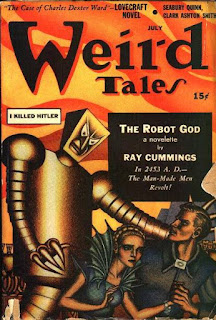The try pots on the Charles W. Morgan
[B]lubber is blubber you know; tho' you may get oil out of it, the poetry runs as hard as sap from a frozen maple tree[.] -- Melville to Richard H. Dana Jr., May 1, 1850
Who would have looked for philosophy in whales, or for poetry in blubber? -- review of The Whale in John Bull (London), October 25, 1851 (quoted in 2 Hershel Parker, Herman Melville: A Biography, 134 [2002])
* * *
To appreciate what Melville was doing in Moby-Dick, and to understand how the book might have struck most readers when it first appeared, it's important, I think, to keep in mind that Melville was writing about a then-thriving industry. The age of sail, of course, was still very much alive, just as the "age of air travel" is today. To the extent that whaling, before Moby-Dick, had anything of a romantic aura, it revolved mostly around the exotic locales that whalers visited, not the work that whalemen actually did.
The work of whalemen was bloody, dirty, smelly, and in many ways repulsive, and whalemen themselves were generally coarse and uneducated. In addition to being sailors and whale killers, they were butchers and processors of animal products. The forecastle, where most of the men lived at sea, was dark, cramped, often ill-ventilated and malodorous, and bug-infested. (In the whaling memoir Nimrod of the Sea [1874], pg. 284, William M. Davis recalls how, after a meal, "each fellow slips his plate into the netting over his berth, and the cockroaches see to it that his crockery is clean for next meal.")
I've often wondered what industry of today is viewed by modern readers in much the same way that 1850s book-buyers might have viewed whaling. What work is ongoing, dangerous, and physical -- even in its most up-to-date form -- and, while not really new, still somewhat unfamiliar and intriguing to moderns?
I think a good candidate is offshore oil drilling in the North Sea.
Consider: Oil drilling has been practiced for about 150 years. In 1850, offshore whaling had been practiced for about 180 years (since the early eighteenth century). Deep-sea oil drilling began in the mid-twentieth century, about 70 years ago. Whaling in the south Pacific began in 1791, about 60 years before Moby-Dick. And both jobs are hard and dangerous -- a good idea of the dangers involved in North Sea oil drilling can be obtained by watching the episode in the National Geographic series "Seconds from Disaster" on the 1988 Piper Alpha disaster, which took 167 lives.
Imagine the genius required to write not just a good novel, but a masterpiece for the ages, about oil men working on a drilling platform in the North Sea.
(The points about the history of whaling are based on Chapter 2 of In Pursuit of Leviathan [1997].)



